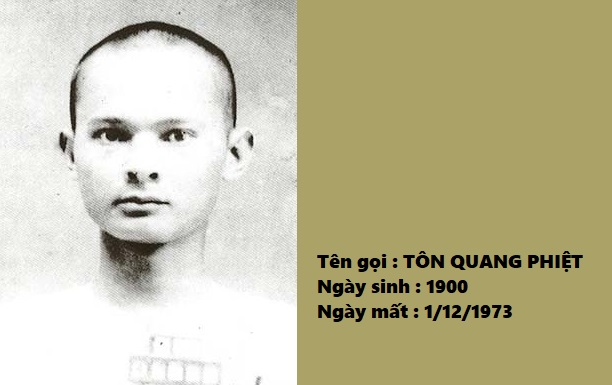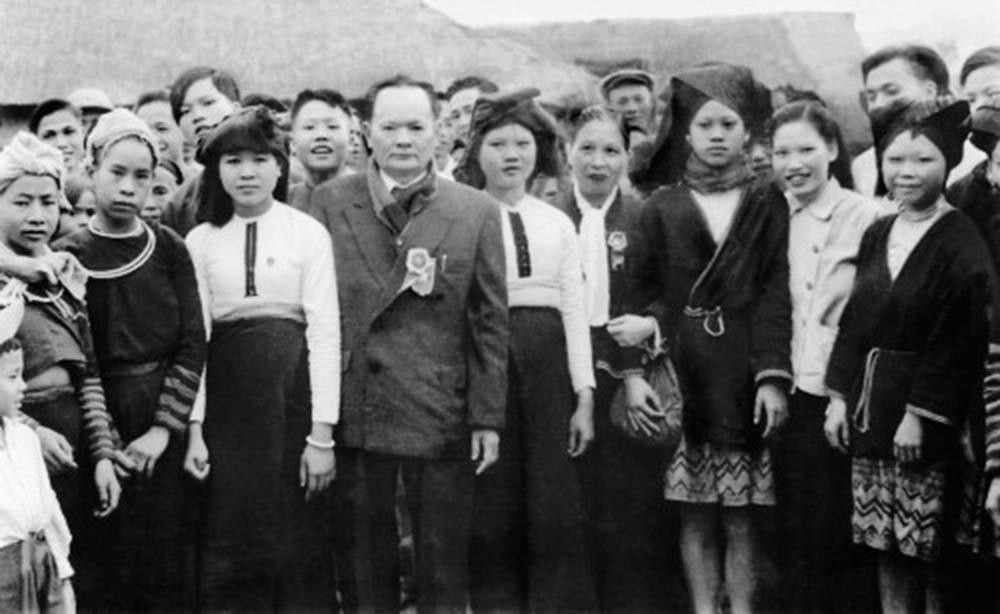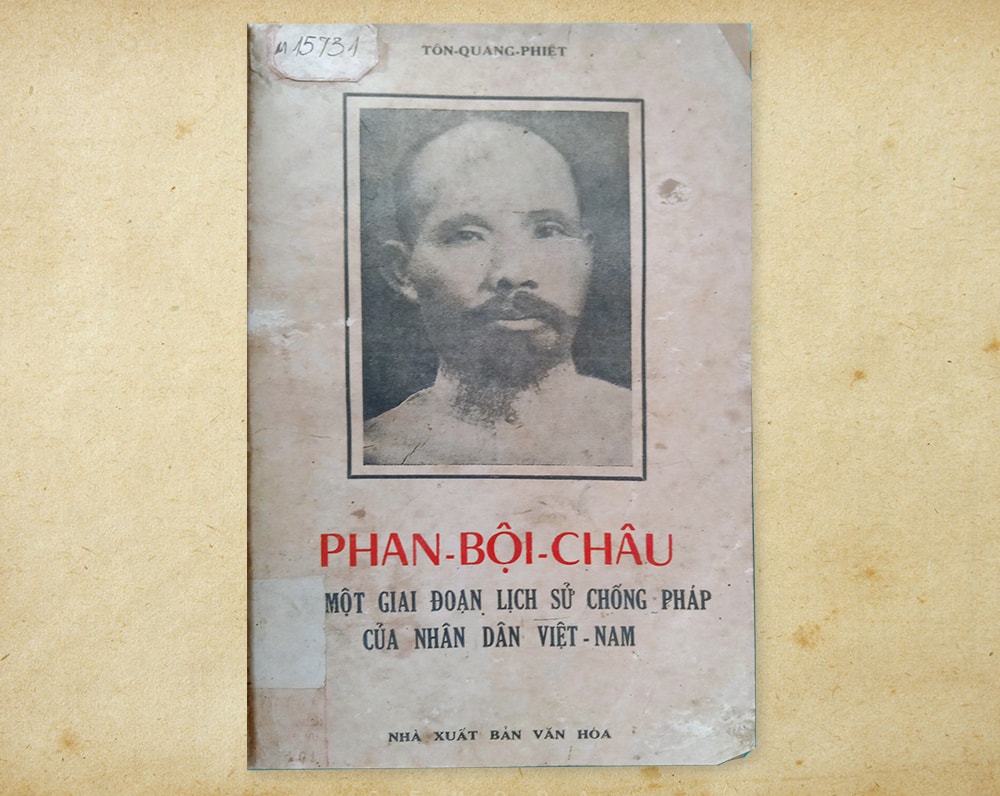Ton Quang Phiet, an intellectual with great patriotism
Comrade Ton Quang Phiet is considered a "bright example of an intellectual with great patriotism, loyal to the revolution and the people, fighting persistently, constantly improving and training himself to meet the standards of a true revolutionary".
Ton Quang Phiet was born in 1900 into a Confucian family in Vo Liet commune, Thanh Chuong district. He was the son of bachelor Ton Thuc Dinh.
The homeland of Ton Quang Phiet is famous for being a land of spiritual and talented people. General Phan Da of Le Loi was brave and intelligent in pursuing the Ming invaders and sacrificed his life at Vo Liet. The people built Bach Ma Temple to worship him. Vo Liet Communal House, with its unique architectural art, is a place where patriotic Confucian scholars gather, discuss poetry and current events. Here, stone steles record the names of Vo Liet's children who passed the Huong, Hoi and Dinh exams. Vo Liet was the district capital from the reign of King Thanh Thai until the August Revolution of 1945.

Vo Liet people responded and actively participated in the Van Than - Can Vuong movements against the French in the late 19th century and the Dong Du movement led by Phan Boi Chau in the early 20th century.
As a child, Ton Quang Phiet was taught Chinese characters by his father and was soon exposed to the passionate patriotic poems and literature of the scholars of Nghe An. The stories of discussions about the fate of the country, the movement against the French and the search for people to save the country between his uncles and his grandfather's students such as the second-class doctor Nguyen Sinh Sac, the first-class doctor Nguyen Chinh, the bachelor Dang Nhu Hai, the second-class doctor Dang Trong Can, the first-class doctor Dang Thai Than... were deeply imprinted in Ton Quang Phiet's mind.
In 1920, Ton Quang Phiet was admitted to the first class of Vinh National School. During his studies, Ton Quang Phiet was always an exemplary student. In his third year, he was able to write short stories and articles with deeply patriotic content.
In 1924, after graduating from Vinh National School, Ton Quang Phiet enrolled in Hanoi Pedagogical College. On January 25, 1925, he and 16 patriotic students of the school, including Pham Thieu, Dang Thai Mai, Nguyen Quoc Tuy... organized the establishment of the Vietnam Righteous Group.
In early 1925, Ton Quang Phiet and Mr. Le Huan went to Thanh Hoa to meet Hoang Van Khai to discuss the organization of the Phuc Viet Association. On July 14, 1925 (French National Day) at Con Meo Mountain in Ben Thuy - Vinh, the Phuc Viet Association was established. The founding members were all intellectuals including: Le Van Huan, Ton Quang Phiet, Ngo Duc Dien...
Ton Quang Phiet was appointed to be in charge of the Bac Ky branch. On December 5, 1925, during the Phan Boi Chau case, members of the Bac Ky group distributed leaflets calling on the people to fight.
In July 1926, Ton Quang Phiet and other members of the Phuc Viet Association such as Tran Phu, Phan Trong Binh, Phan Trong Quang, Nguyen Van Loi, Hoang Tung... went to Guangzhou (China) under the organization and guidance of Le Duy Diem; but before crossing the border, he and Hoang Tung were arrested by French secret police. Without enough evidence, after a while the secret police had to release Ton Quang Phiet.
At the end of 1929, Ton Quang Phiet was arrested and the Southern Court of Nghe An province sentenced him to 7 years of hard labor and 7 years of house arrest according to judgment No. 11 dated January 21, 1930 and exiled him to Buon Ma Thuot. In prison, Ton Quang Phiet and his fellow political prisoners composed poetry and literature as a weapon to fight against the harsh prison regime. In 1933, Ton Quang Phiet was released.
In 1934, Ton Quang Phiet taught in Vinh; in 1937, he was the principal of Thuan Hoa private school (Hue). He participated in activities of the association for the propagation of the national language, wrote for newspapers, campaigned for the Indochina Congress and participated in the democratic front in Hue.
On August 23, 1945, the uprising to seize power in Hue succeeded. Ton Quang Phiet was elected as the first Chairman of the People's Revolutionary Committee of Thua Thien province, then Chairman of the Thua Thien Administrative Committee.

From 1946 to 1963, Ton Quang Phiet was continuously a National Assembly delegate and held many important positions: Member of the Standing Committee, concurrently Secretary General of the National Assembly Standing Committee, Chairman of the Administrative Resistance Committee of Thanh Hoa Province; Vice Chairman of the Inter-Zone IV Inter-Vietnam Committee, Chairman of the Vietnam-Africa People's Solidarity Committee; Vice President of the Vietnam-China Friendship Association; Member of the Central Executive Committee of the Vietnam-Soviet Friendship Association, Member of the Central Committee of the Vietnam Fatherland Front, Member of the Executive Committee of the Vietnam Historical Science Association.
During his revolutionary activities, Ton Quang Phiet also composed poetry, wrote history and researched social sciences. His typical works and research projects include: "History of the Vietnamese people's resistance to foreign invasion" - published in 1946; "On the path of struggle of the Vietnamese people" - published in 1950; "Phan Boi Chau and a historical period of the Vietnamese people's resistance to the French" - published in 1958...

On December 1, 1973, Ton Quang Phiet breathed his last, ending a life devoted to national independence and socialism, as described in the eulogy read on December 5, 1973: "a shining example of an intellectual with a strong love for the country, loyal to the revolution and the people, fighting persistently, constantly improving and training himself to meet the standards of a true revolutionary".
With his great contributions to the revolutionary cause, Ton Quang Phiet was awarded the Ho Chi Minh Medal and many other noble awards by the State.
